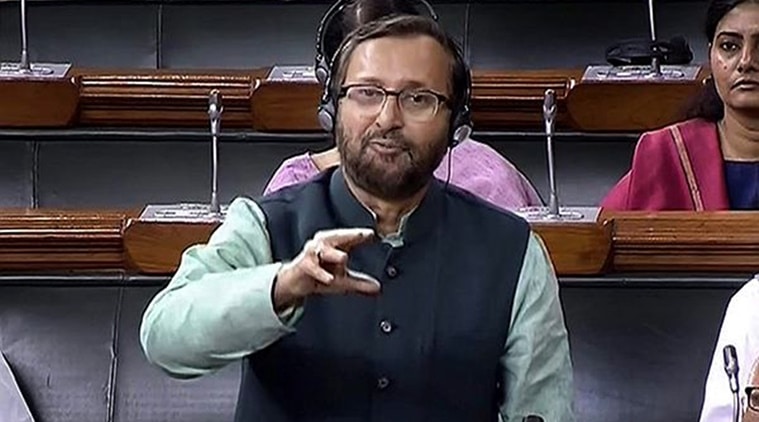 HRD Minister Prakash Javadekar speaks in the Lok Sabha during the Monsoon session of Parliament, in New Delhi on Monday, July 30, 2018
HRD Minister Prakash Javadekar speaks in the Lok Sabha during the Monsoon session of Parliament, in New Delhi on Monday, July 30, 2018
Amid a controversy over the Central government’s decision to grant Institution of Eminence status to Jio Institute of the Reliance Foundation, Human Resource Development Minister Prakash Javadekar on Monday said that the Rs 1,000-crore government grant is meant only for public sector institutes which have received the eminence tag. He also said that only a Letter of Intent (LoI) has been issued to the proposed Jio Institute.
Javadekar argued that several factors, including a 15-year vision and five-year implementation, academic, recruitment, research, and administrative plans, etc, were “comprehensively considered” by the empowered expert committee headed by N Gopalaswami before the six institutions – three each in public and private sectors – were granted the status.
“Let me once again clarify that no greenfield university, which is not in existence but has a plan to come up in future, has been given the status of Institution of Eminence. They have been only issued Letter of Intent with a clear guideline of what they should do for three years, complete the process, and then only they will be granted status after verification and inspection,” Javadekar said in Lok Sabha in reply to a question raised by the TMC’s Prasun Banerjee.
The minister said 114 applications were received for the Institution of Eminence tag — 74 from public institutions, 29 private universities, and 11 in greenfield category. To TMC’s Saugata Roy, who asked whether the HRD Ministry will reconsider the decision with regard to Jio Institute, Javadekar said it has “nothing to do with the government”. He said LoIs have been issued to Jio Institute and Manipal Academy of Higher Education, with the condition that the they will submit a report to the HRD Ministry, indicating their readiness for commencing academic programmes under the Institutions of Eminence tag within three years of getting the LoI.
“The government is giving Rs 1,000 crore only to public institutes – that is, the IITs (Delhi and Bombay) and the IISc (Bengaluru). Not a paisa is given to private institutes,” Javadekar said.
Replying to another question, Javadekar said the newly formed National Testing Agency (NAT) will conduct national-level examinations such as NET, NEET, JEE. These exams, he said, will not be held online but only “computer-based” – students will have to reply on already downloaded answer-sheets using the mouse.
Pointing out that the government will have to keep in mind issues regarding internet connectivity in many parts of the country, Javadekar said the test will not be in an online format. He said the government is also considering letting students take entrance exam using paper answer-sheets during the transitional first year.
Javadekar said questions were raised about the “non-scientific” manner in which papers are set in different Board and university tests. Asked whether the government will provide special training for students from rural areas, he said: “Students will get five months to practice. They will practice on Saturdays and Sundays, which means nearly 20 Saturdays and Sundays. They do not require that much time because students are sharp, and students especially from rural areas are sharper.”